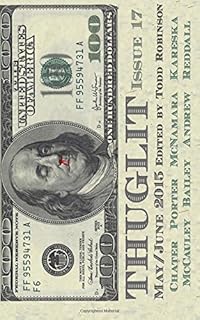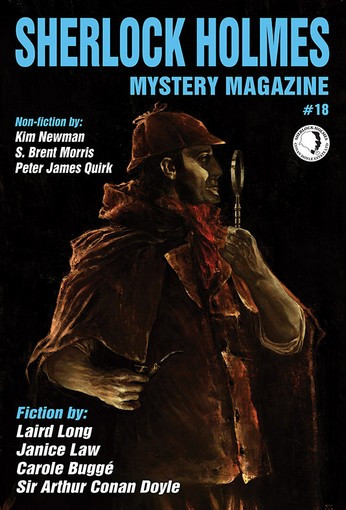I recommend that all those judges take the time they save and do something good for society. I would help, but I have to start reading next year's stories.
This is the seventh time I have made an annual list. By coincidence, there were 14 stories on last year's list, and the same number this time.
The big winner this year was Ellery Queen's Mystery Magazine, with four stories. Tied with two each are Sherlock Holmes Mystery Magazine, Strand Magazine, Thuglit, and the Jewish Noir anthology.
Nine stories are by men; five by women. (That's one more female winner than last year.) Four are historical, four are funny, two are parody/pastiches.
Okay. Drum roll, please...
 Camilleri, Andrea. "Neck and Neck," in The Strand Magazine," October 2015-January 2016.
Camilleri, Andrea. "Neck and Neck," in The Strand Magazine," October 2015-January 2016.Montalbano, Camilleri's series character, is appointed Chief Inspector in a village in Sicily, and discovers that a Mafia family feud is well under well. A member of the Cuffaros is snuffed out with an old-fashioned shotgun, and then one of the Sinagras dies the same way.
But then something highly irregular happens. Two members of the same family are killed in a row. How unseemly! And Montalbano spots a way into the maze of silence...
Faherty, Terence. "The Man With The Twisted Lip," in Ellery Queen's Mystery Magazine, February 2015.
My former co-blogger Terence Faherty is making his third appearance on my annual best of list. Only three other authors have scored that many times.
Faherty claims to have discovered Dr. John Watson's notebooks, containing the rough drafts of Sherlock Holmes adventures, before they were "cleaned up for publication." This is the fourth in his series.
Both versions begin with a woman calling at the home of Watson and his wife, desperate because her husband has disappeared. In Doyle's version the man is a drug addict and has vanished into an opium den. In Faherty's tale the same man is a serial philanderer and is apparently staying in a hotel of bad repute.
"My husband returns!" Rita exclaimed.
"Not a moment too soon," Holmes said.
"You don't understand. He's insanely jealous. And violent. If he finds me in here--"
Holmes sprang up. "Watson, I bow to your experience. Under the bed?"
 Gould, Heywood. "Everything is Bashert," in Jewish Noir, edited by Kenneth Wishnia, PM Press, 2015.
Gould, Heywood. "Everything is Bashert," in Jewish Noir, edited by Kenneth Wishnia, PM Press, 2015.I have a story in this book. Heywood Gould's tale is about Franny and Larson, two petty lowlifes who like to spend their days at Aquaduct. And it is at that race track one day that they run into a hasidic gentleman they call the rabbi (he isn't). The rabbi has a Bible-based system for betting on the horses, a sure thing of course, and yet somehow he is short of money. Go figure. Our heroes lend him some cash and, well, a wild ride commences that involves among other things, breaking into a morgue, and ends with a sort of spiritual enlightment. A treat from start to finish.
Hockey, Matthew J. "Canary," in Thuglit, 18, 2015.
Booster is a fireman with a chemistry degree, which earns him the dubious privilege of being the first into a meth lab gone deadly. He's the one who enters in full HAZMAT gear and has to determine if all the idiots inside were killed by the poisonous brew they created or whether there might be survivors. And this time he finds a bag stuffed with four hundred grand. Obviously he ought to leave it where it lies, but who will know if he doesn't? And so he takes one step off the straight-and-narrow...

Kareska, Lane. "Big Hard Squall," in Thuglit, issue 17, 2015.
Abby has been brutally attacked and locked in the trunk of her car, which is now headed for parts unknown. We stay in Abby's head as she runs through her life and concludes that there is no one who would want to do this to her. Therefore the target must be her daughter Margaret, a prosecuting attorney. Either someone wants to punish Margaret or else put a squeeze on her, and Abby is the pawn in jeopardy. But when the trunk lid opens Abby and us - are in for surprises.
Lewis, Evan. "The Continental Opposite," in Alfred Hitchcock's Mystery Magazine, May 2015.
What chutzpah. Lewis has revived Dashiell Hammett's Continental Op.
This story takes place in the fifties, decades after the Op's last appearance. The main character is a young detective named Peter Collins (he notes bitterly that his father deliberately gave him a name that is gangland slang for "nobody"). Peter works for the Portland, Oregon branch of a national detective agency and when he accuses his boss of corruption the company sends in a retired op who used to work for the San Francisco branch ("sometime in the forties Continental had put him out to pasture, and he'd spent the years since killing a vegetable garden, sneering at golf courses, and not catching fish."). This guy strongly resembles Hammett's hero, much older and, if possible, more cynical. A brilliant story.
Liss, David. "Jewish Easter," in Jewish Noir, edited by Kenneth Wishnia, PM Press, 2015.
Al's family moved from Long Island to Jacksonville, Florida, when he was in third grade, because of his stepfather's import business. Now he is thirteen and has begun to figure out exactly what is being imported.
But that's not his immediate problem. There are a couple of anti-Semetic rednecks in his class and when they hear about Passover (which the sensitive teacher helpfully describes as "Jewish Easter,") they decide to invite themselves forcefully to the seder. Let all who are hungry come and eat, right?
What I loved about the story is not the suspense but the surprising choices the characters make (especially the grandmother). It kept me guessing right up to the last paragraph.
Maron, Margaret. "We On The Train!" in Ellery Queen's Mystery Magazine, May 2015.
Greg McInnis is a DEA agent who prefers to travel by train. On a trip up the east coast he is amused by a young African-American woman who is gleefully phoning everyone she knows to tell them that she is going to visit New York with an older man she says is her Uncle Leon.
Sounds innocent enough, but this is a crime story, so something else must be going on here. Will our hero figure it out in time? He only has four pages...
Newman, Kim. "Red Jacks Wild," in Sherlock Holmes Mystery Magazine, Issue 17, 2015.
John Carmody is a psychologist in New York in 1951. He also happens to be Jack the Ripper.
Wait a minute, you say. He'd have to be a hundred years old.
Well, he is. But he looks the same age he did in the 1880s when he started making human sacrifices to the evil goddess Hecate. Which he still does, every three years.
But not prostitutes every time. He alters his "disposables," choosing victims from a group no one will care about. Which makes him a weathervane pointing at whoever is on the bottom of the social pile. This story is all about America's twisted psyche, and I loved it.
Opperman, Meg. "The Discovery," in Sherlock Holmes Mystery Magazine, Issue 18, 2015.
While studying at a university in her native Venezuela Celeste meets and marries Robert and moves to Washington, D.C. Robert is a classic abusive, controlling, husband. Celeste's every move is watched, her phone calls monitored. When her bus home is late she is beaten.
Reaching into a hand-carved box, I sort through the gold jewelry and select Robert's latest apology.
But what makes this story more than just a tale of domestic misery is that each scene is prefaced with a quotation from Christopher Columbus's letters or logbooks, describing his encounters with the natives of the new world. It is no accident that Celeste and Robert get married on Columbus Day.
Palumbo, Dennis. "A Theory of Murder," in And All Our Yesterdays, edited by Andrew MacRae, Darkhouse Books, 2015.
The publisher sent me this book for free.
It's Bern, Switzerland, 1904. Hector, a clerk in the patent office, is suspected of a series of grisly murders. Luckily a friend of his, also a patent clerk, is looking into the crimes. And Albert Einstein is a pretty bright guy... Wish I'd thought of that.
Ross, Gary Earl. "Good Neighbors," in Buffalo Noir, edited by Ed Park and Brigid Hughes, Akashic Press, 2015.
Lou and Athena have retired after running their Greek restaurant for decades. Lou's hobby is antiques. He doesn't collect them, he just wants to buy low and sell high. But then he discovers that his elderly neighbor Helen has a house full of the things. And Helen has no relatives, no favorite charities, no one to leave her precious belongings to. So Lou and Athena set out to become really good neighbors and wait for Helen to pass away.
But then the Washingtons move in on the other side, and it turns out that they are good neighbors too. This story is well-written, beautifully structured, and one of those rare pieces I reread as soon as I finished it.
Rozan, S.J. "Chin Yong-Yun Meets A Ghost," in Ellery Queen's Mystery Magazine, March-April 2015.
 This
is my
buddy S.J. Rozan's second story told
by the formidable mother of her series detective Lydia Chin. When Mrs.
Chin gets a phone call from Gerald Yu she is annoyed for three
reasons. First, Yu is a gambler and not very
bright. Second, he wants to involve daughter Lydia in his troubles.
And third, he happens to be dead.
This
is my
buddy S.J. Rozan's second story told
by the formidable mother of her series detective Lydia Chin. When Mrs.
Chin gets a phone call from Gerald Yu she is annoyed for three
reasons. First, Yu is a gambler and not very
bright. Second, he wants to involve daughter Lydia in his troubles.
And third, he happens to be dead."It's about my death, but it's not vengeance I'm after. Also, it's not really about my death, because I'm not dead."
"Who told you that? They're lying."
Rusch, Kristine Kathryn. "Christmas Eve at the Exit," in Ellery Queen's Mystery Magazine, January 2015.
This is Ms. Rusch's second appearance on my annual best list.
It is Christmas eve and Rachel and her little girl are on the run. Many pages will pass before we find out from who, and about the shadowy support system that is helping them.
Rachel is terrified, not sure who to trust, and desperately trying to keep up an appearance of normality for her daughter who, heartbreakingly, seems mostly concerned about Santa Claus. This story will appear in holiday-themed anthologies for years to come.





































